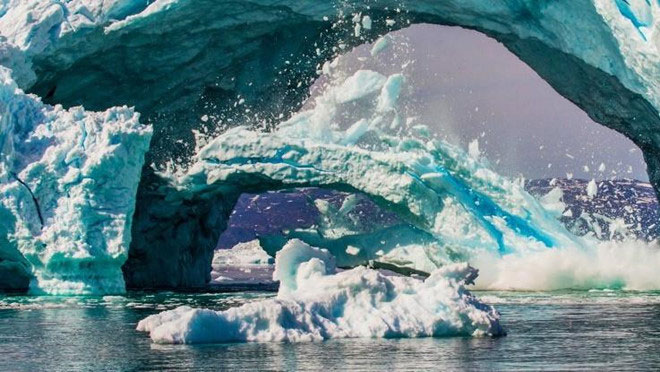Greenland ice melted six times faster, raising global sea levels
Scientists have found that the area of Greenland ice sheets is decreasing with the melting of ice into the oceans never seen in nearly half a century.
Climate change is causing many of Greenland's large ice sheets to melt at breakneck speeds. This process is so serious that it contributes significantly to the phenomenon of global sea level rise, according to a study of the Greenland ice sheet published by the American scientific journal PNAS.
Scientists analyzed the change in Greendland ice sheet balance by comparing the amount of ice flowing into the sea and the amount of snow accumulated deep in the island over the past 46 years. They found that the rate of disappearance increased almost six times during this time, faster than the scientists ever predicted, according to CNN.
"We want to have a long-term accurate study of Greenland's scale, including changes when global climate begins to deviate from natural fluctuations, beginning in the 1980s," Eric Rignot, co-author of the scientific report, said.

Ice in Greenland is melting at an unprecedented pace in just under half a century, significantly increasing global sea level.(Photo: iStock).
Experts at the University of California said Greenland glaciers are flowing faster and faster.
"The glaciers will accelerate and the snow will melt further. We can predict the island's area continues to decline sharply. The amount of water contributing to the global sea level rise will increase rapidly over the years." Rignot said.
Greenland is the world's largest island located in the North Pole. Snow ice covers much of the island.
Scientists estimate ice melted in Greenland since 1972, causing global sea levels to rise by nearly 13.7mm. The ice on this island is the largest source of water for the ocean each year. The amount of ice melted in Greenland since the 1980s is far greater than the area of ice lost thousands of years ago.
Previous studies warned that the thawing process in Greenland was too late to reverse, even if governments cut greenhouse gas emissions and slowed climate change. All of Greenland ice melting could cause sea level rise of more than 6m.
A study in December 2018 showed that Greenland's ice sheets were melting at an unprecedented rate for decades, nearly 50 percent higher than pre-industrialization.
- Greenland ice melting threatens Northeast United States and Canada
- Greenland ice is constantly melting
- Greenland ice melted like never before
- The melted Greenland ice sheet makes sea level rise faster
- The giant ice sheet separated from Greenland
- Greenland ice suddenly melted massively
- Greenland lost nearly 200 billion tons of ice in a month
- Arctic ice melted faster than expected
- Greenland Glacier shattered, a clear sign of climate change
- Sea level rise abnormally
- Greenland ice is constantly melting
- 50 lakes were discovered under the Greenland ice sheet
- The Arctic ice melted four times faster than forecast
- Why is Greenland covered by ice?
 Is the magnetic North Pole shift dangerous to humanity?
Is the magnetic North Pole shift dangerous to humanity? Washington legalizes the recycling of human bodies into fertilizer
Washington legalizes the recycling of human bodies into fertilizer Lightning stone - the mysterious guest
Lightning stone - the mysterious guest Stunned by the mysterious sunset, strange appearance
Stunned by the mysterious sunset, strange appearance